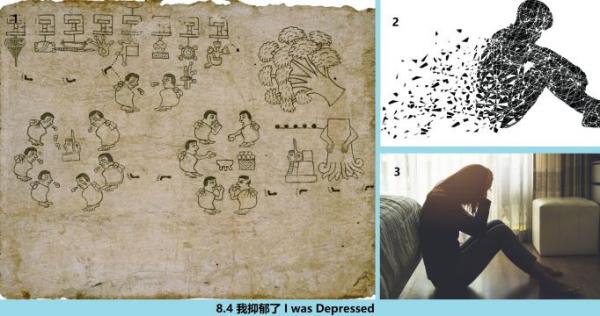2003年9月的一天,一个工地,同事刘加力(Garry Liu)气冲冲地来找我,说: “我又听说你不给你爸爸打电话。你爸爸委托你的邻居和朋友劝你,你谁的话也不听。” 我愣住了,明白过来后,问:“是谁让你来劝我?” 刘加力(Garry Liu)愣住了,知道自己是突然说了这个话题,回答说:“谁也没让我来劝你。前天我去世嘉堡 (Scarborough)开会,休息时,有人故意在我后面说你的事。这不是他们知道我和你的关系不错,又和我不熟,就故意这么做,让我来劝你么!这事咱们全公司的人都知道了,结果我跟你连这点事都说不明白,那我是啥人呐!我还怎么做人呐!你还知道,你爸爸的身体不好,说不定哪天就咽气了。你怎么就感受不到他老人家的那片心呢!我跟你说,等他死了,你肯定后悔,到那时,你肠子悔青了也没用!我还听说你爸爸知道你在加拿大生活得不开心,想尽办法来帮你,可是你就是不接受!这爹跟儿子打架,儿子生气到你这种程度的,我长这么大,就从来没听说过!” 刘加力和我一样,都是老实人,生气脸就红。这时,他激动得像是要哭了似的。我赶紧说:“我知道了,回家就给他打电话。过一段时间,回去看他。” 他走了,一会儿又回来了,说:“他们没说你爸爸病危,你回家的事可能也用不着那么着急。我看你脸色不好,像是病了。我已经跟工地的经理说了,你把这里的工作交给我。今天,你早点回去,好好休息休息!”

2 回家的路上,我把车开到一个空停车场,然后放声大哭。这时,我虽是怀疑,但认为我以前在和平房产局(参见第6章)和在拓疆房地产公司(参见8.1节)工作时,背后有刘团长的帮助。我出国后,没有了他的帮助,两年多了,连个正经的工作都找不着。我回国去看望他,说什么呀!?没脸去见他!我又想:这是刘健君到现在还没找着对象,还结婚后又离婚了!?老头子又想起我来了,又闹心了!可是我已经结婚了,还能怎么办!我失声哭过后,全身舒服了,忽然想,“老头子这是又玩什么花样?你不是要用 “死不瞑目” 诅咒我么,一辈子不能和我见面吗?” 注2,就在这时,“死不瞑目”(参见2.4节《刘团长对桃花劫的讲解》)这个诅咒从我的无意识跳到了意识。我感觉刘团长是在诅咒我,但我并没有回忆出什么证据,只是隐约地感觉我在第6章《和平房产局》时,也是他在背后帮助我。 3 一天夜里,我妻子突然对我说:“你怎么了?三更半夜不睡觉,在那里唉声叹气!” 我说:“我什么也没想。” 妻子说:“我都看得很清楚,自从我说我怀孕了,你就不开心了,一天天的总是闷闷不乐,在那里发呆。” 这时我才意识到,两周前和刘加力谈话后,我的全身都像是有沉重的感觉(注3),不一样,心情也不一样。将有孩子了,我和妻子商量换家公寓住。我也打算找份新工作,离开这家岩土顾问公司,那老头子(刘团长)就找不着我了。 注3,当时我不懂,现在想来,那时我患了抑郁症。 返回成熟期的目录
|
